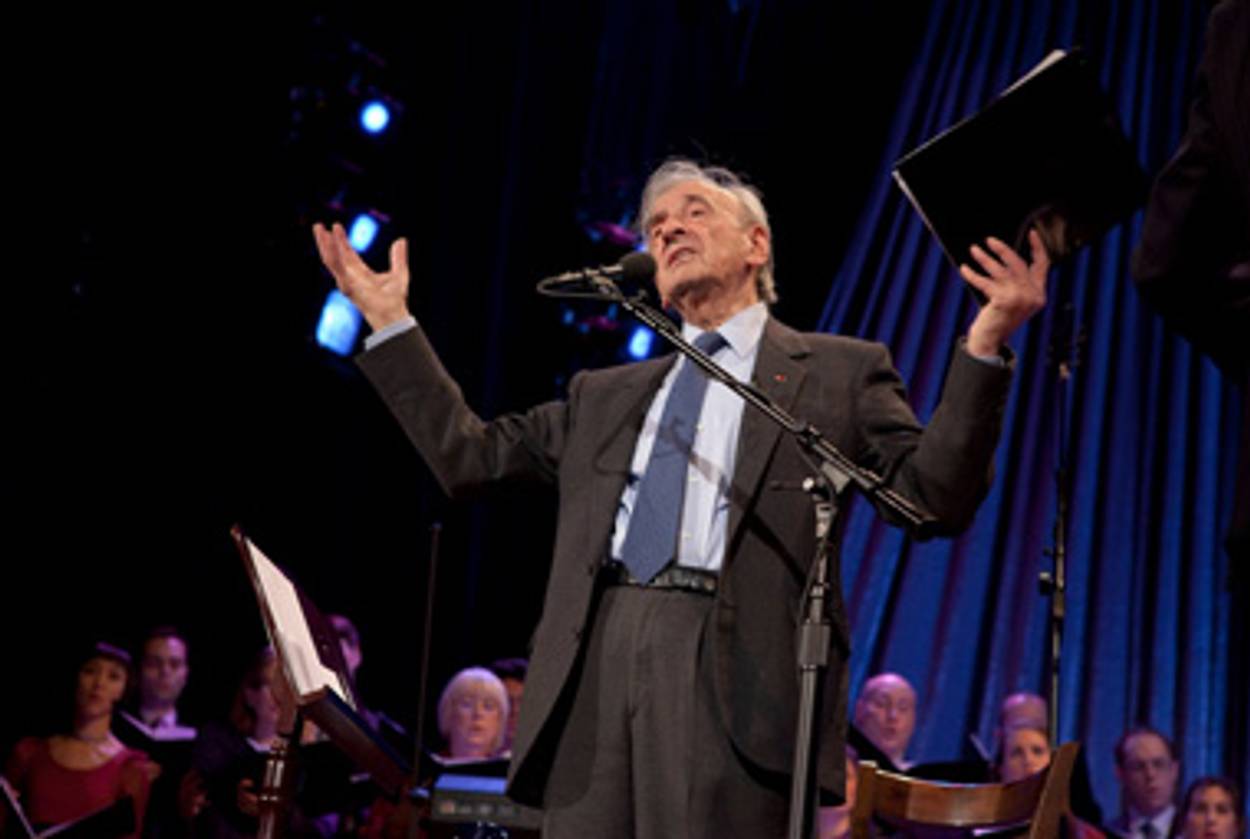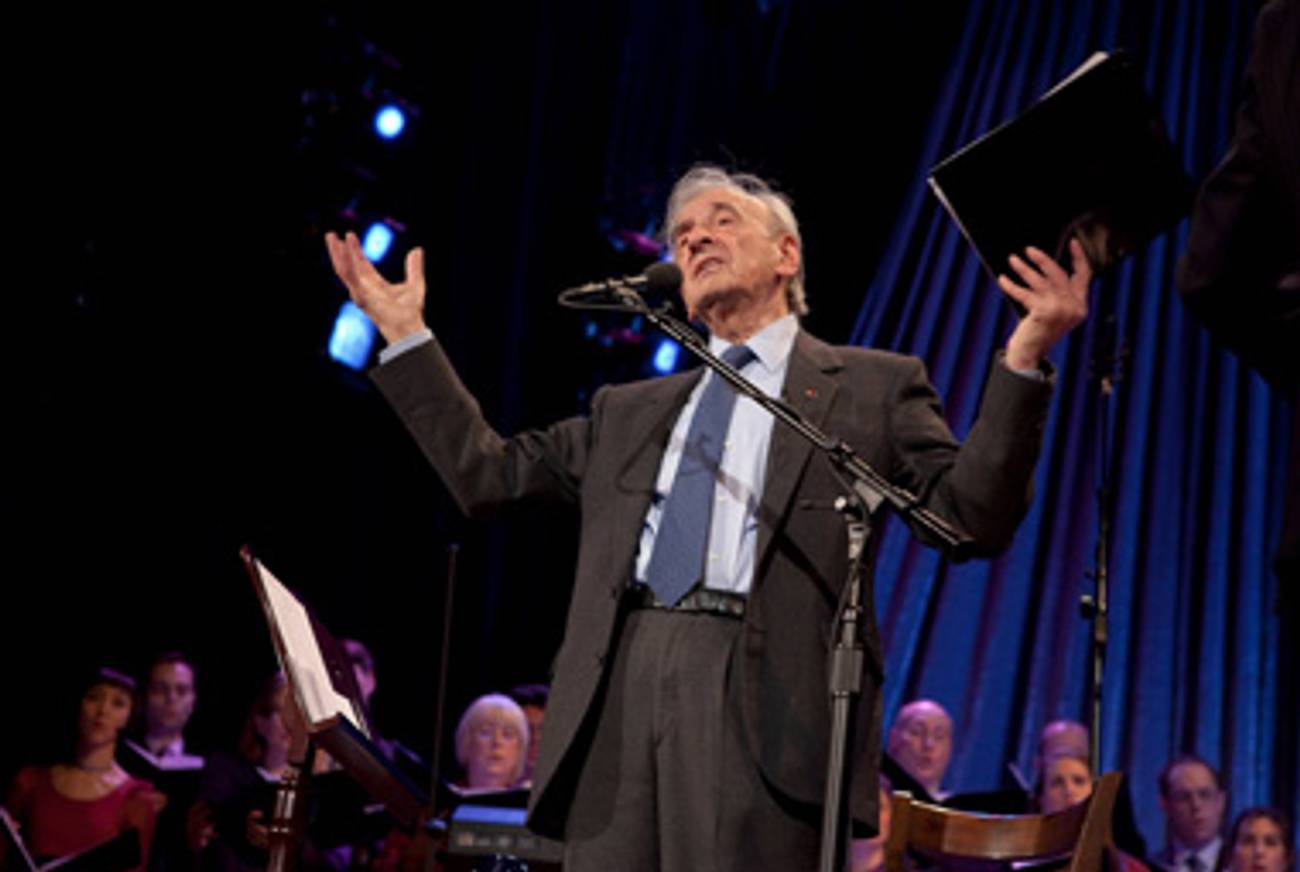Voice of Peace
Elie Wiesel took to the 92Y stage this week for an evening of Yiddish standards, childhood reminiscences, and Borscht Belt shtick. Somehow it worked.




Sitting in the audience at the 92nd Street Y last Saturday, listening to “Elie Wiesel in Concert: Memories and Melodies of My Childhood,” I was stirred by a range of feelings.
I was curious to see how Wiesel, the prolific author and frequent lecturer, would do as a singer. Wiesel has often said that some of his earliest memories are, in fact, melodies—the melodies that he heard growing up as a child in Sighet, Romania. He even earned a little cash directing choirs as a refugee in Paris after the war. But that was 60 years ago, and while Wiesel has continued to sing in private—at home and at family celebrations—time is not necessarily kind to the voice.
I was also moved by the stories Wiesel told between songs—stories of his mother singing to him in her kitchen; of his grandfather, a Vizhnitzer Hasid, welcoming the Sabbath in song; and of the meaningful musical experiences he continued to have both during and after the war.
But mostly, I was confused.
The phrase “in concert” carries with it a number of expectations, most of them musical. But Wiesel was quick to admit that there were probably much better singers in the room that night. On the other hand, he was accompanied by a small orchestra that included the keyboardist and arranger David Rosenthal, best known for his long association with Billy Joel; and by a 16-voice choir under the direction of Matthew Lazar. (Wiesel is honorary president of Lazar’s Zamir Choral Foundation.)
So, was this a concert or not?
The changes in tone were confusing, too. There was plenty of reminiscing, with Wiesel taking the familiar role of memoirist and raconteur; and he occasionally made the kind of moral entreaty which, taken together with his personal and literary history, has made him a kind of secular saint. But he also occasionally dipped into corny stage humor that, while innocuous, was nonetheless jarring. One minute one of the world’s foremost moral voices was imploring his fellow men not to stand idly by, with “arms folded,” in the face of widespread injustice and oppression. The next, he was making jokes: “Remember,” he cracked, “in Yiddish, where there’s an ‘oy,’ there’s a ‘vey!’ ”
Like I said, I was confused. Confused enough to call concert producer Phil Ramone a couple of days later in the hope that he could help me better understand precisely what it was that I had witnessed.
Ramone is a legendary music producer who has racked up 14 Grammys working with everyone from Bob Dylan and Bruce Springsteen to Aretha Franklin and Ray Charles. To my immense relief, even he had a hard time describing Saturday’s event.
Ramone and Wiesel met and became friends just over a year ago and soon began talking about the possibility of recording Wiesel singing some of the songs that he had grown up with, as a musical gift for his own grandchildren. Eventually, they went into the studio to record a few tracks; and Ramone brought the results to Rosenthal, who added light orchestral backgrounds.
At that point, some of Wiesel’s other friends, including the noted film and television producer John Heyman, began asking Ramone if he thought there might be some kind of event in the making. Ramone, who in the interim had gone to see Wiesel lecture, thought there was; but he felt that it should be shot as a DVD, so that it would fully capture Wiesel’s personal charisma and his way of engaging with an audience.
But producing what eventually became Saturday’s event was no simple undertaking. For one thing, Wiesel is not Frank Sinatra, and figuring out how to present him on stage in a musical setting was not entirely straightforward.
“It’s daunting,” Ramone said after the fact. “What are you trying to do? Your instinct is to produce it not unlike doing a good musical night, but you can’t. It doesn’t engage that way.”
Even from a purely musical perspective, Ramone wasn’t sure how to proceed. The program consisted of 20 songs plucked from Wiesel’s memory and included everything from prayers like “Ani Maamin,” based on Maimonides’ 13 articles of faith (in the early 1970s, Wiesel wrote the libretto for a cantata by the same name by French composer Darius Milhaud), to Yiddish standards like “Rozhinkes mit Mandlen” and old Hasidic tunes such as “Shebshifleinu.” The evening also included a French children’s song (“À la Claire Fontaine”) and a Hungarian number that became a sort of anthem for Jewish concentration camp inmates (“Szól a Kakas Már”).
“There wasn’t any tradition for me to look at and say, ‘Oh, this would work,’ ” Ramone said. “You couldn’t stay in a liturgical mode, or a cappella.” Nor was there a clear pop or classical model to follow. The entire project had a searching, experimental quality to it, and no one, including its producer and its star, knew exactly how it would all turn out.
In the end, Ramone decided to keep things simple. He made the musical accompaniment as unobtrusive as possible, and did his best to ensure that Wiesel would feel as comfortable in front of the choir as he would have at an ordinary speaking event, where he tends to work off-the-cuff.
I think Ramone succeeded, which goes a long way toward explaining what it was I saw, and why I found it somewhat perplexing. At heart, the show remained true to Wiesel’s initial intention—to offer his musical memories as a gift to his grandchildren—even as he took the project to a much larger stage. The self-deprecating disclaimer concerning his vocal ability (and, yes, he did occasionally drift off key or beat his accompanists to the end of a phrase, though he also showed a real gift for traditional Jewish vocal ornamentation, especially on the Vizhnitzer tunes his grandfather taught him); the shifts in tone; the mishmash of tunes—these are only confusing in the context of an actual concert, a carefully planned evening of musical entertainment. They’re not so strange if one imagines them in the context of a family gathering, where one’s father or grandfather or uncle is telling anecdotes peppered with fragments of his favorite songs. That’s pretty much what we got at the 92nd Street Y, except the grandfather in question was a Holocaust-surviving Nobel Peace-Prize winner, and he burst into song a lot more often than zayde normally would—and with much better backing.
The entire performance was filmed, and Ramone plans to review the footage in January with an eye toward figuring out what to do with it next. As with the event itself, he’s keeping an open mind, with few preconceptions. “It’ll be handled very delicately once I’ve seen it and had a chance to see what its life can be like,” he said.
There will be no repeat performances, however; no out-of-town runs. Wiesel accomplished what he set out to do, preserving his personal musical heritage for his family, and he has no intention of going Judy Garland again. “I hope,” he told the crowd, “you do not expect to witness a late-life career change.”
Perhaps that’s for the best. Wiesel was a better singer than I expected, but his true talents lie elsewhere.
Alexander Gelfand is a recovering ethnomusicologist, a sometime jazz pianist, and a former West African drummer. His work has appeared in the New York Times, the Chicago Tribune, the Forward, and elsewhere.
Alexander Gelfand is a recovering ethnomusicologist, a sometime jazz pianist, and a former West African drummer. His work has appeared in the New York Times, the Chicago Tribune, the Forward, and elsewhere.